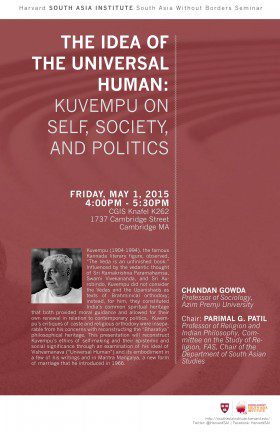SAI South Asia Without Borders Seminar
Chandan Gowda, Professor of Sociology, Azim Premji University
Chair: Parimal G. Patil, Professor of Religion and Indian Philosophy, Committee on the Study of Religion, FAS, Chair of the Department of South Asian Studies
Kuvempu (1904-1994), the famous Kannada literary figure, observed, “The Veda is an unfinished book.” Influenced by the vedantic thought of Sri Ramakrishna Paramahamsa, Swami Vivekananda, and Sri Aurobindo, Kuvempu did not consider the Vedas and the Upanishads as texts of Brahminical orthodoxy; instead, for him, they constituted India’s common spiritual heritage that both provided moral guidance and allowed for their own renewal in relation to contemporary politics. Kuvempu’s critiques of caste and religious orthodoxy were inseparable from his concerns with reconstructing the “Bharatiya” philosophical heritage. This paper reconstructs Kuvempu’s ethics of self-making and their epistemic and social significance through an examination of his ideal of Vishvamanava (“Universal Human”) and its embodiment in a few of his writings and in Mantra Mangalya, a new form of marriage that he introduced in 1966.

